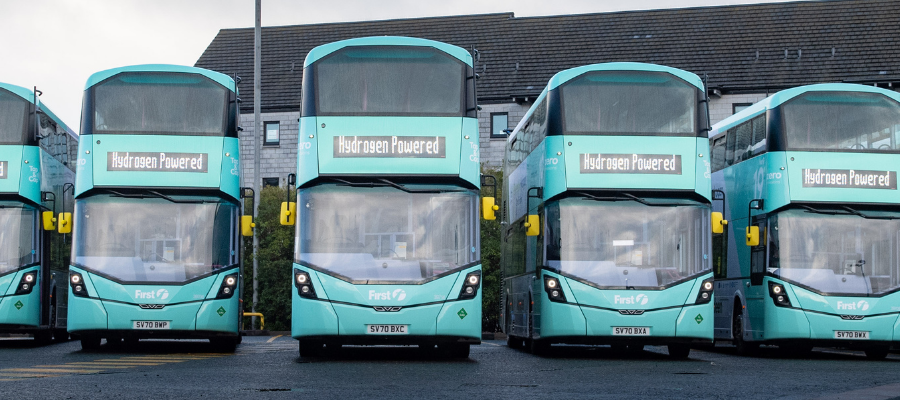🕒 Article read time: 3 minutes
Is hydrogen the fuel of the future?

With an atomic weight of just one, hydrogen is both the lightest element on the periodic table and the most abundant chemical element in the known universe.
Could this colourless, odourless, tasteless, flammable gaseous substance prove to be the answer to the transport industry’s decarbonisation challenge?
Two automotive companies that certainly think it has a big role to play are Groupe Renault, the French car and van manufacturer, and Wrightbus, one of the UK’s three remaining bus manufacturers.
COMBINING ALTERNATIVE FUEL WITH FRENCH FLAIR
Groupe Renault’s ambitious plans are based on going into partnership with alternative fuel specialists Plug Power. By working with this leader in fuel cell systems and hydrogen-related services, the French multinational automobile manufacturer is planning to produce a hydrogen fuel cell light commercial vehicle (LCV).
Set to launch in the middle of 2021, the partnership is expected to position the two companies at the forefront of research and development, transformation, manufacturing and sale of fuel cell-powered vehicles and hydrogen turn-key solutions. The joint venture is designed to serve not just the LCV market, but the taxis and commercial passenger vehicles markets too.
GREATER THAN THE SUM OF ITS PARTS
It is hoped that the partnership will bring together the strengths of both organisations, combining Groupe Renault’s experience in new sustainable energies with Plug Power’s 20 years’ experience in fuel cell technologies and hydrogen solutions.
“This joint-venture project is fully aligned with our strategy to offer market ready hydrogen solutions for LCVs,” said Luca de Meo, CEO of Renault, “With Plug Power, we will build a unique end-to-end fuel cell value chain and offer turn-key solutions for customers including vehicles, refuelling stations and decarbonised hydrogen delivery.”
Andy Marsh, CEO of Plug Power, is similarly enthusiastic about the venture. “Plug Power prides itself on being at the leading edge of innovation in the hydrogen fuel cell industry,” he said, “which is why we are thrilled to partner with Groupe Renault to become a leader of market fuel cell heavy vans in Europe. We look forward to working with our new partners to combine our technology with their decades long-experience leading the European automotive market.”
WORLD’S FIRST HYDROGEN BUSES GO INTO SERVICE
Meanwhile, in northeast Scotland, the world’s first fleet of double decker hydrogen buses went into service last Thursday (28 January 2021), in the city of Aberdeen in northeast Scotland.
ENERGY CAPITAL OF EUROPE
Often dubbed ‘Granite City’ for its grey-stone buildings, Aberdeen is ironically also known as the capital of Europe’s offshore oil industry, owing to its strategic proximity to oil fields in the North Sea.
Now the city looks to rebrand itself as the ‘Energy Capital of Europe’, with an interest in the development of new energy sources. In a project led by Aberdeen City Council, the buses represent a major step forward in reducing climate change at a local level. The start of the zero-emission buses on their service routes marks the start of the city’s transition from oil and gas to green energy as part of the its Net Vision Zero.
Councillor Jenn Laing, Aberdeen City Council’s Co-Leader, said: “It’s great to see the world’s first hydrogen double decker buses starting on their service routes in Aberdeen.
“The buses are a fantastic asset to the city as an entrepreneurial and technological leader as they have even more advanced technology which pushes established hydrogen boundaries and also greatly assist us in tackling air pollution in the city.”
ZERO EMISSIONS AT TAILPIPE
Built by Wrightbus in Northern Ireland, one of the UK’s last three remaining bus manufacturers, the zero-emission fleet emits nothing more than water from its exhausts. Plus, plans are in place for Aberdeen to make its own hydrogen to power the buses, making it an even greener energy source for the local community.
Wrightbus chairman, Jo Bamford, who recently spoke at Logistics UK’s Future Logistics Conference, said: “Everyone at Wrightbus is incredibly proud to see the world’s-first hydrogen double decker bus fleet in full service and carrying passengers around the streets of Aberdeen. It marks a pivotal moment in the city’s commitment to reaching net zero.
“We will see further Wrightbus hydrogen buses in locations across the UK, with fleets due to launch in Birmingham and London later this year. It’s vital that other towns and cities sit up and take note of their example.
“Hydrogen has an important part to play in the decarbonisation of transport and the reduction of CO2 levels that we need to reach to ensure a net zero future.”
TACKLING AIR AND NOISE POLLUTION
The new 60-seat double-deckers are set to transform the air of the granite city as they save one kilogram of CO2 with each kilometre they drive. The buses will also tackle more than just air pollution, as they are virtually silent when they run, helping to create quieter, calmer streets.
“The buses show our commitment to achieving net zero and support the global energy transition as a climate positive city,” said Councillor Douglas Lumsden, Co-Leader of Aberdeen City Council, “while cementing our position as a world leader in the energy sector as an economic driver for the city, region, Scotland and the UK.”
*www.logistics.uk.org/campaigns/environment
Published On: 04/02/2021 17:00:40

Comments Section
If you are a Logistics UK member login to add comments.